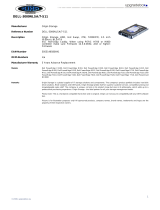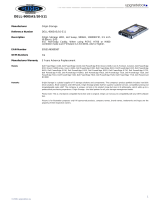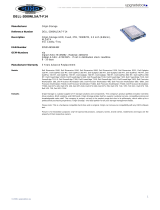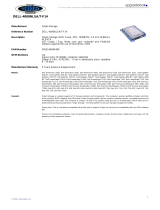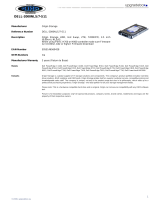Page is loading ...

Dell EMC OpenManage Essentials Version 2.5
Support Matrix
1
December 2018
Rev. A01

Notes, cautions, and warnings
NOTE: A NOTE indicates important information that helps you make better use of your product.
CAUTION: A CAUTION indicates either potential damage to hardware or loss of data and tells you how to avoid
the problem.
WARNING: A WARNING indicates a potential for property damage, personal injury, or death.
© 2018 Dell Inc. or its subsidiaries. All rights reserved. Dell, EMC, and other trademarks are trademarks of Dell Inc. or its subsidiaries.
Other trademarks may be trademarks of their respective owners.

Introduction
Dell EMC OpenManage Essentials is a hardware management application that provides a comprehensive view of Dell EMC
systems, devices, and components in your environment. This document lists the agents, devices, operating systems, and
databases supported by OpenManage Essentials version 2.5.
NOTE: Dell EMC SupportAssist Enterprise integrates with OpenManage Essentials to provide proactive support capabilities
for enterprise servers, storage, and networking solutions by using the existing environment data. For the list of devices
supported by Dell EMC SupportAssist Enterprise, see the Dell EMC SupportAssist Enterprise Support Matrix.
Topics:
• Supported agents
• Supported devices
• Supported operating systems
• Supported databases
• Supported browsers
•
Minimum recommended hardware for OpenManage Essentials
• Other minimum requirements
• Support for stateless deployment
• Known limitations for stateless deployment
• Accessing documents from the Dell EMC support site
Supported agents
NOTE:
For more information about the agents listed, see their respective product documentation available on the support
site.
Table 1. Agents supported by OpenManage Essentials
Dell EMC systems agents Supported version
Dell EMC OpenManage Server Administrator
For the 11th, 12th, 13th, and 14th generation of PowerEdge
servers—9.1, except for the following PowerEdge servers:
● R840, R940XA—9.1.1
● MX840C, MX740C—9.1.2
Dell EMC Lifecycle Controller/ iDRAC
All the 14th generation of PowerEdge servers—3.21.21.21 and
later versions, except for the following PowerEdge servers:
● MX840C, MX740C—3.20.20.20
For the 12th and 13th generation of PowerEdge servers—
2.50.50.50 and later versions
For the 11th generation of PowerEdge servers:
● Monolithic systems—1.98 and later versions
● Modular systems—3.65 and later versions
Chassis Management Controller (CMC)
For the PowerEdge MX7000 chassis—1.0
For the PowerEdge M1000e chassis—6.1
For the PowerEdge VRTX chassis—3.1
For the PowerEdge FX2 and FX2s sleds—2.1
1
Introduction 3

Table 1. Agents supported by OpenManage Essentials (continued)
Dell EMC systems agents Supported version
Dell Command Monitor (previously Dell OpenManage Client
Instrumentation)
9.1 and later versions
Dell Networking OS
9.10.0.0, 9.10.0.1P10, 9.11.0.0, 9.11.2.0, 9.13.0.0, and 9.14.0.0
Supported devices
Supported Dell EMC PowerEdge servers
NOTE: In the PowerEdge server name format yxxx; y denotes alphabets, for example M, MX, R, or T, and x denotes
numbers.
Table 2. Supported PowerEdge servers
yx0x systems yx1x systems yx2x systems yx3x systems yx4x systems
PowerEdge M600 PowerEdge R210 PowerEdge M420 PowerEdge M630 PowerEdge M640
PowerEdge M605 PowerEdge R210 II PowerEdge M520 PowerEdge M830 PowerEdge R240
PowerEdge M805 PowerEdge R310 PowerEdge M620 PowerEdge T130 PowerEdge R340
PowerEdge M905 PowerEdge R510 PowerEdge M820 PowerEdge T330 PowerEdge R440
PowerEdge R200 PowerEdge R515 PowerEdge R220 PowerEdge T430 PowerEdge R540
PowerEdge R300 PowerEdge R610 PowerEdge R320 PowerEdge T630 PowerEdge R640
PowerEdge R805 PowerEdge R710 PowerEdge R420 PowerEdge R230 PowerEdge R6415
PowerEdge R900 PowerEdge R810 PowerEdge R520 PowerEdge R330 PowerEdge R740
PowerEdge R905 PowerEdge R815 PowerEdge R620 PowerEdge R430 PowerEdge R740xd
PowerEdge T100 PowerEdge R910 PowerEdge R720 PowerEdge R530 PowerEdge R740xd2
PowerEdge T105 PowerEdge R410 PowerEdge R720xd PowerEdge R530xd PowerEdge R7415
PowerEdge T300 PowerEdge R415 PowerEdge R820 PowerEdge R630 PowerEdge R7425
PowerEdge T605 PowerEdge R715 PowerEdge R920 PowerEdge R730 PowerEdge R840
PowerEdge T110 PowerEdge T320 PowerEdge R730xd PowerEdge R940
PowerEdge T110 II PowerEdge T420 PowerEdge R830 PowerEdge R940XA
PowerEdge T310 PowerEdge T620 PowerEdge R930 PowerEdge T140
PowerEdge T410 PowerEdge FC420 PowerEdge FC430 PowerEdge T340
PowerEdge T610 PowerEdge FC620 PowerEdge FC630 PowerEdge T440
PowerEdge T710 PowerEdge FM120x4 PowerEdge FC830 PowerEdge T640
PowerEdge M610 PowerEdge FC640
PowerEdge M610x PowerEdge MX840C
PowerEdge M710 PowerEdge MX740C
PowerEdge M710HD
PowerEdge M910
4 Introduction

Table 3. Supported PowerEdge C-Series servers
C-Series
PowerEdge C6220 PowerEdge C6100 PowerEdge C4130
PowerEdge C8220 PowerEdge C5220 PowerEdge C6320
PowerEdge C6320p PowerEdge C6420 PowerEdge C4140
NOTE: Among the supported PowerEdge C-Series servers, OpenManage Essentials supports the server configuration
management feature only on PowerEdge C4130, C6320, C6320p, and C6420.
Supported Dell EMC VxRail Hyper-converged appliances
Table 4. Supported VxRail Hyper-converged appliances
VxRail Hyper-converged appliances
VxRail E460 VxRail E460F VxRail P470 VxRail P470F
VxRail V470 VxRail V470F VxRail S470
Supported Dell EMC XC Series Web-Scale converged appliances
Table 5. Supported XC Series Web-Scale converged appliances
XC Series Web-Scale converged appliances
XC6320-6 XC6320-6AF XC430 Xpress XC430-4
XC430-8 XC630-10 XC630-10AF XC630-10P
XC730-16G XC730xd-12 XC730xd-12C XC730xd-12R
XC730xd-12R Xpress XC730xd-12S XC730xd-24 XC730xd-24S
NOTE: The SATADOM-specific information is not displayed in the device inventory of OpenManage Essentials.
Supported Dell Storage module
PowerEdge FD332
Supported Dell EMC chassis devices
● PowerEdge VRTX
● PowerEdge M1000e
● PowerEdge MX7000
● PowerEdge FX2
● PowerEdge FX2s
Supported Dell EqualLogic devices
Table 6. Supported EqualLogic devices
EqualLogic devices
EqualLogic PS4000E EqualLogic PS5500E EqualLogic PS6110S EqualLogic PS6510X
EqualLogic PS4000X EqualLogic PS6000E EqualLogic PS6110X EqualLogic PS6610E
Introduction 5

Table 6. Supported EqualLogic devices (continued)
EqualLogic devices
EqualLogic PS4000XV EqualLogic PS6000X EqualLogic PS6110XS EqualLogic PS6610X
EqualLogic PS4100X EqualLogic PS6000XV EqualLogic PS6110XV EqualLogic PS6610ES
EqualLogic PS4100XV EqualLogic PS6010 EqualLogic PS6210E EqualLogic PS-M4110
EqualLogic PS4100E EqualLogic PS6010E EqualLogic PS6210X EqualLogic PS-M4110X
EqualLogic PS4110X EqualLogic PS6010X EqualLogic PS6210XV EqualLogic PS-M4110XV
EqualLogic PS4110XV EqualLogic PS6010XV EqualLogic PS6210S EqualLogic PS-M4110E
EqualLogic PS4110E EqualLogic PS6010XVS EqualLogic PS6210XS EqualLogic PS-M4110XS
EqualLogic PS4210E EqualLogic PS6100 EqualLogic PS6500
EqualLogic PS4210X EqualLogic PS6100E EqualLogic PS6500E NAS appliances
EqualLogic PS4210XV EqualLogic PS6100S EqualLogic PS6500ES EqualLogic FS7500
EqualLogic PS4210XS EqualLogic PS6100X EqualLogic PS6500X EqualLogic FS7600
EqualLogic PS5000E EqualLogic PS6100XV EqualLogic PS6510 EqualLogic FS7610
EqualLogic PS5000X EqualLogic PS6100XS EqualLogic PS6510E
EqualLogic PS5000XV EqualLogic PS6110E EqualLogic PS6510 ES
NOTE: Only EqualLogic NAS appliances with Fluid File System (Fluid FS) version 3 are supported.
Supported Dell PowerVault devices
Table 7. Supported PowerVault devices
PowerVault devices
PowerVault NX200 PowerVault MD3200 PowerVault MD3620i Tape Libraries/Drives
PowerVault NX300 PowerVault MD3200i PowerVault MD3620f PowerVault TL2000
PowerVault NX3000 PowerVault MD3220 PowerVault MD3660i PowerVault TL4000
PowerVault NX3100 PowerVault MD3220i PowerVault MD3660f PowerVault ML6000
PowerVault NX3230 PowerVault MD3260 PowerVault MD3800i
PowerVault NX3330 PowerVault MD3260i PowerVault MD3800f
PowerVault NX3500 PowerVault MD3400 PowerVault MD3820f
PowerVault NF500 PowerVault MD3420 PowerVault MD3820i
PowerVault DP500 PowerVault MD3460 PowerVault MD3860f
PowerVault DL2000 PowerVault MD3600i PowerVault MD3860i
PowerVault DL2100 PowerVault MD3600f
PowerVault DL2200
PowerVault MD3060e
6 Introduction

Supported Dell EMC devices
Table 8. Supported devices
Devices CX4 Series - Flare / Navisphere CX4 Series - Flare / Unisphere
Dell EMC CX300 Dell EMC CX4-120 Dell EMC CX4-120
Dell EMC CX3-10 Dell EMC CX4-240 Dell EMC CX4-2400
Dell EMC CX3-20 Dell EMC CX4-480 Dell EMC CX4-480
Dell EMC CX3-40 Dell EMC CX4-960 Dell EMC CX4-960
Dell EMC CX3-80
Dell EMC CX500
Dell EMC CX700
Supported Dell EMC Storage devices (previously Dell Compellent devices)
Table 9. Supported Storage devices
Storage devices
Dell Compellent SC4020 NAS appliance
Dell Compellent SC7020 Dell Compellent FS8600 version 3
Dell Compellent SC8000
Dell Compellent SC9000
Storage SCv2000
Supported Dell Disk Backup devices
● Dell DR4300
● Dell DR4300e
● Dell DR6300
Supported Dell Networking devices (previously PowerConnect and Dell
Force10 devices)
Table 10. Supported Networking devices
Networking devices
PowerConnect 2808 PowerConnect 6224F PowerConnect B-8000
PowerConnect 2816 PowerConnect 6248 PowerConnect B-8000e
PowerConnect 2824 PowerConnect 6248P PowerConnect B-MLXe 16
PowerConnect 2848 PowerConnect 7000 PowerConnect J-SRX210
PowerConnect 3424 PowerConnect 7024 PowerConnect J-SRX240
PowerConnect 3424P PowerConnect 7024F PowerConnect J-EX4200 (48T)
PowerConnect 3448 PowerConnect 7024P PowerConnect J-EX8216
PowerConnect 3448P PowerConnect 7048 PowerConnect M6220
PowerConnect 3548 PowerConnect 7048F PowerConnect M6348
Introduction 7

Table 10. Supported Networking devices (continued)
Networking devices
PowerConnect 3548P PowerConnect 7048P PowerConnect M8024
PowerConnect 3524 PowerConnect 8024 PowerConnect M8024K
PowerConnect 3860 PowerConnect 8024F PowerConnect M8428K
PowerConnect 5224P PowerConnect 8100 PowerConnect W-3200
PowerConnect 5316M PowerConnect 8132 PowerConnect W-3600
PowerConnect 5324 PowerConnect 8132F PowerConnect W-6000 M3
PowerConnect 5424 PowerConnect 8164 PowerConnect W-650
PowerConnect 5448 PowerConnect 8164F PowerConnect W-7210
PowerConnect 5524 PowerConnect B-DCX-4S PowerConnect W-7220
PowerConnect 5548 PowerConnect B-RX 4 PowerConnect W-7240
PowerConnect 6224 PowerConnect B-RX 8
PowerConnect 6224P PowerConnect B-RX 16
Dell Force10 C150 Dell Force10 S50 Dell Force10 S4820T
Dell Force10 C300 Dell Force10 S55 Dell Force10 S5000
Dell Force10 E1200i Dell Force10 S60 Dell Force10 S6000
Dell Force10 E300 Dell Force10 S3048 Dell Force10 Z9000
Dell Force10 E600i Dell Force10 S4048 Dell Force10 Z9100
Dell Force10 E610 Dell Force10 S4810 Dell Force10 MXL 10/40GbE
Dell Force10 S25P Dell Force10 S4820P
Dell Networking C7004 Dell Networking N3048P Dell Networking W7205
Dell Networking C7008 Dell Networking N4000 Dell Networking X1008
Dell Networking C9010 Dell Networking N4032 Dell Networking X1008P
Dell Networking N2024 Dell Networking N4032F Dell Networking X1018
Dell Networking N2024P Dell Networking N4064 Dell Networking X1018P
Dell Networking N2048 Dell Networking N4064F Dell Networking X1026
Dell Networking N2048P Dell Networking M3020 Dell Networking X1026P
Dell Networking N3024 Dell Networking M3048 Dell Networking X1052
Dell Networking N3024P Dell Networking S6010-ON Dell Networking X1052P
Dell Networking N3024F Dell Networking S6100-ON Dell Networking X4012
Dell Networking N3048 Dell Networking S4048T-ON Dell Networking Z9500
PowerEdge M IO Aggregator PowerEdge FN2210S PowerEdge FN410S
PowerEdge FN410T
Supported Dell EMC Ready Nodes
Table 11. Supported Ready Nodes
Ready Nodes
ScaleIO R640 VxFlex R640
8 Introduction

Table 11. Supported Ready Nodes (continued)
Ready Nodes
ScaleIO R740xd VxFlex R740xd
Supported network security appliances
● Dell SonicWALL NSA 250M
Supported Brocade devices
Table 12. Supported Brocade devices
Brocade devices
Brocade 200E Brocade 5100 Brocade 6505 Brocade M6505
Brocade 300 Brocade 5300 Brocade 6510 Brocade 8000
Brocade 4424 Brocade M5424 Brocade 6520 Brocade 8424-K
Supported managed rack Power Distribution Units
● K538N
● G756N
● H544N
● J523N
● K539N
Supported metered rack Power Distribution Units
Table 13. Supported metered rack Power Distribution Units
Power Distribution Units
1X98J XX5T6 C0G4D G740N G744N
7P35N RXKCH G728N H534N H537N
09FG8 K5YYY J519N J520N J521N
4J1C2 2CM2K K535N K536N 6809
Supported Keyboard, Video, and Mouse (KVM)
Table 14. Supported Keyboard, Video, and Mouse (KVM)
Keyboard, Video, and Mouse (KVM)
1081AD 2161AD 2161DS-2 2321DS 4332DS
1082DS 2161DS 2162DS 4161DS
Introduction 9

Supported Dell UPS
Table 15. Supported Dell UPS
Dell UPS
1000T HV 500T HV 2700R/T LV 2700R Telco HV 5600R LI HV-US
4200R HV 1000R LV 2700R/T HV 3750R HV-US 5600R LI HV
1920T LV 1000R HV 2700R/T HV-US 3750R HV 5600R OL HV-US
1920T HV 1920R LV 2700R Telco LV 4200R HV-US 5600R OL HV
500T LV 1920R HV 2700R Telco HV-US 4200R HV
Supported Dell printers
Table 16. Supported Dell printers
Dell printers
Dell W5300 Dell 5130cdn Dell 2335dn Dell 1710n Dell B1165nfw
Dell S2500 Dell 5110cn Dell 2330dn Dell 1600n Dell C1660w
Dell M5200 Dell 5100cn Dell 2155c(d)n Dell 1320c Dell C1760nw
Dell 5535dn Dell 3335dn Dell 2150cdn Dell B2360d/dn Dell C1765nf/nfw
Dell 5530dn Dell 3130cn Dell 2145cn Dell B3460dn Dell B1265dfw
Dell 5330dn Dell 3115cn Dell 2135cn Dell B3465dn/dnf
Dell 5310n Dell 3110cn Dell 2130cn Dell B5460dn
Dell 5230dn Dell 2355dn Dell 1815dn Dell B5465dnf
Dell 5210n Dell 2350dn Dell 1720n Dell B1163/w
Supported client systems
Table 17. Supported client systems
Client systems
Latitude 13 Latitude E6400 Precision R5400 Precision T7810 OptiPlex 9030
Latitude 10 ST2 Latitude E6410 Precision R7610 OptiPlex 980 OptiPlex XE
Latitude D531 Latitude E6540 Precision R7910 OptiPlex 990 OptiPlex XE2
Latitude 14 Rugged
Extreme 7407
Latitude E6430U Precision R7920 OptiPlex 3011 OptiPlex 7010
Latitude 3550 Latitude E7240 Precision T1700 OptiPlex 3020M Dell Venue 11 Pro
7130/7139
Latitude E3440 Latitude E7440 Precision T3600 OptiPlex 3030
Latitude E3540 Latitude E7450 Precision T3610 OptiPlex 9010AIO
Latitude E5450 Latitude Z600 Precision T5610 OptiPlex 9020
Latitude E6220 Precision M4700 Precision T7610 OptiPlex 9020AIO
NOTE: If an alert is received from a device with unknown severity, you can import the device MIB files using the MIB
Import Utility to enable OpenManage Essentials to classify the alerts.
10 Introduction

OEM devices
Dell EMC OEM devices (re-branded or de-branded Dell servers and Compellent S8000 iDRAC), when discovered, are classified
under OEM Devices in the device tree. Most of the functionality available to the PowerEdge servers, such as tasks, reports,
and filters are also applicable to the PowerEdge OEM servers. However, system update may not be possible if it is not
supported by the OEM device module. OEM servers are always classified under the OEM Devices group in the device tree.
They are not displayed under the Servers or RAC group. If both the server and RAC of the OEM device are discovered, they
are correlated and displayed as one device under the OEM Devices group. Other OEM devices except servers and RAC are
classified under the different server groups such as Microsoft Virtualization Servers, VMware ESX servers, and so on, based on
the classification criteria they fulfill.
Supported operating systems
This section lists the operating systems on which you can install OpenManage Essentials (on a management station) and the
operating systems that OpenManage Essentials can manage (for managed systems).
Supported operating systems for management stations
● Microsoft Windows Server 2016 Standard and Datacenter Editions
● Windows Server 2012 R2 Standard and Datacenter Editions
● Windows Server 2012 Standard and Datacenter Editions
● Windows Server 2008 R2 SP1 Standard and Enterprise Editions
NOTE: OpenManage Essentials version is supported only on 64-bit operating systems.
NOTE: The Wow64 component is required to run on a 64-bit operating system.
NOTE: OpenManage Essentials is also supported on virtual machines.
NOTE: Ensure that KB2919355 update is installed on Windows 2012 R2 systems to run OpenManage Essentials 2.5. To
install KB2919355 update manually, see the Microsoft Knowledge Base article ID 2919355 at www.support.microsoft.com.
Supported operating systems for managed systems
Dell EMC systems and operating system versions that OpenManage Essentials can manage correspond to the Dell systems and
operating systems supported by Dell OpenManage Software. For the Dell systems and operating system versions that
OpenManage Essentials can manage, see Dell Systems Management - OpenManage Software Support Matrix. On the Support
page, click OpenManage Software, and then click the appropriate version of OpenManage software.
NOTE: The operating systems supported by OpenManage Software vary depending on the OpenManage Software version.
Supported operating systems for managed client systems
The Dell systems and operating system versions that OpenManage Essentials can manage correspond to the Dell systems and
operating systems supported by Dell Command Monitor. For the Dell systems and operating system versions that OpenManage
Essentials can manage, see the Dell systems and operating systems listed in the Dell Command | Monitor User's Guide. To
access the User’s Guide, visit www.dell.com/support. On the Support page, click Choose from all products > Software &
Security > Dell Client Command Suite > Dell Command | Monitor, and then click the appropriate version of Dell Command
Monitor.
NOTE: The operating systems supported by Dell Command Monitor vary depending on the Dell Command Monitor version.
Introduction 11

Supported databases
NOTE: Only case-insensitive instance of SQL Server is supported. It is recommended that you install the latest SQL Server
Service pack.
● Microsoft SQL Server 2016 Standard, Enterprise, and Express Editions
● SQL Server 2014 Standard, Enterprise, and Express Editions
● SQL Server 2012 Standard, Enterprise, and Express Editions
● SQL Server 2008 R2 SP1 Standard, Enterprise, and Express Editions
NOTE: If you choose to install OpenManage Essentials on a local database, Microsoft SQL Server 2014 SP2 Express edition
is installed on the system. For large deployments, you must use SQL Standard.
NOTE: While installing OpenManage Essentials on a local database, ensure that Microsoft SQL Server Express editions are
configured with 'SQLEXPRESSOME' named instance. For more information about the local database instances supported,
see the Installing OpenManage Essentials technical white paper on the Dell TechCenter.
NOTE: Both 32-bit and 64-bit versions of Microsoft SQL Server are supported. However, it is recommended to use a 64-bit
version of Microsoft SQL Server.
NOTE: OpenManage Essentials database does not support the 'Always On Availability Groups' feature of Microsoft SQL
Servers.
Supported browsers
● Microsoft Internet Explorer 10 and 11
● Mozilla Firefox 50 and 51
NOTE: Supported only on Windows-based operating systems.
Minimum recommended hardware for OpenManage
Essentials
Table 18. Minimum recommended hardware
Minimum
recommende
d hardware
Large deployments Large deployments Large deployments Medium
deployments [a]
Small
deployments [a]
Number of
devices
Up to 8000 Up to 5500 Up to 2000 Up to 500 Up to 100
Type of
system
Physical machines /
Virtual machines
Physical machines /
Virtual machines
Physical machines /
Virtual machines
Physical
machines /
Virtual machines
Physical
machines / Virtual
machines
RAM 16 GB 8 GB 8 GB 6 GB 6 GB
Processor
cores
16 8 8 4 2
Database
SQL Enterprise or
Standard
SQL Enterprise or
Standard
SQL Enterprise or
Standard
SQL Express SQL Express
Database
location
Remote [b] Remote [b] Remote [b] Local Local
Database size 14 GB 10 GB 6 GB 2 GB 1 GB
12 Introduction

Table 18. Minimum recommended hardware (continued)
Minimum
recommende
d hardware
Large deployments Large deployments Large deployments Medium
deployments [a]
Small
deployments [a]
Free space on
hard drive
30 GB 20 GB 10 GB 10 GB 10 GB
[a] If you are not using SQL Express, limit the maximum memory to 2 GB less than the total system memory and disable SQL
analysis and report services.
[b] Install the remote database on a system that supports the minimum recommended hardware for OpenManage Essentials.
NOTE: Before upgrading to OpenManage Essentials version 2.5, ensure that the system is configured with SQL Server
Enterprise or Standard edition, 8 GB RAM and 8 cores processor when configuration deployment and compliance features
are used.
NOTE: The recommended minimum hardware requirements for OpenManage Essentials on a domain controller are 8 GB
RAM, 8 cores processor, and a remote database.
NOTE: If Dell EMC SupportAssist Enterprise is installed along with OpenManage Essentials, you require 2 GB RAM and 2
cores in addition to the minimum requirements described in the previous table. If you are using SQL Server Standard or
Enterprise Editions, the maximum SQL Server memory must be configured within SQL Server to prevent it from using the
entire system memory. It is recommended that you use a maximum of 4 GB for a 6 GB RAM.
Other minimum requirements
● Microsoft .NET Framework version 4.6.2
● Microsoft SQL Server database, for more information, see Supported databases.
● Operating system, for more information, see Supported operating systems.
● Supported browsers, for more information, see Supported browsers.
● Microsoft Silverlight version 5.1.50907
● Microsoft Visual C++ 2015 Runtime 14.0
● Network Bandwidth—1 Gbps or higher
NOTE:
The recommended minimum network bandwidth required for OpenManage Essentials in a WAN environment is 10
Mbps (for monitoring) and 20 Mbps (for updates).
Support for stateless deployment
Stateless deployments depend on the Host Bus Adapter (HBA) cards available in the PowerEdge servers. A server may have
HBA cards manufactured by one or more vendors. Stateless deployments may or may not be supported on a server depending
on the HBA card vendor.
NOTE:
For the list of HBA card types that support stateless deployment, see “Supported cards for I/O Identity
Optimization” in the iDRAC User’s Guide at Dell.com/idracmanuals.
NOTE: Before you perform stateless deployment, ensure that the HBA cards have the latest firmware version installed.
Known limitations for stateless deployment
The following are the known limitations for deploying virtual I/O identities on target servers:
● On Broadcom network adapters, OpenManage Essentials does not support boot from ISO for installing the operating system
on a SAN along with the virtual I/O identity deployment. However, if an operating system is already installed on the SAN,
after deployment of virtual I/O identities, the server can boot from the SAN.
● For PowerEdge FC430, FC630, and FC830 sleds, the PCIe cards (FC and iSCSI) in the shared PCIe slots of the PowerEdge
FX2s chassis are supported for stateless deployment. However, if the PCIe cards are mapped, replacement can be
Introduction
13

performed only to an exactly similar sled in the same slot with the same PCIe mapping in another chassis. If the PCIe cards
are not mapped, replacement can be performed on any similar sled.
● For performing stateless deployment on blade servers, the FlexAddress mode must be disabled on the blade server to
prevent the host chassis from assigning I/O identity attributes. Even if the FlexAddress mode is enabled, OpenManage
Essentials overrides the FlexAddress mode.
● While performing a stateless deployment on a server with a QLogic Converged Network Adapter, OpenManage Essentials
generates different attribute values for the virtual MAC (vMAC) and virtual FIP (vFIP) MAC attributes. However, only the
value of the vMAC attribute is deployed for both the vMAC and vFIP MAC attributes. If you create a zone for SAN boot
before the deployment, ensure that the zone is created based on the vMAC address generating virtual WWPN (vWWPN)
and virtual WWNN (vWWNN). For example, 20:00:vMAC for vWWNN and 20:01:vMAC for vWWPN.
● Intel NIC cards do not support unique iSCSI initiator name for each port. OpenManage Essentials deploys the same IQN value
for all ports in the Intel NIC card.
Accessing documents from the Dell EMC support site
You can access the required documents in one of the following ways:
● Using the following links:
○ For Dell EMC Enterprise Systems Management, Dell EMC Remote Enterprise Systems Management, and Dell EMC
Virtualization Solutions documents — www.dell.com/esmmanuals
○ For Dell EMC OpenManage documents — www.dell.com/openmanagemanuals
○ For iDRAC documents — www.dell.com/idracmanuals
○ For Dell EMC OpenManage Connections Enterprise Systems Management documents — www.dell.com/
OMConnectionsEnterpriseSystemsManagement
○ For Dell EMC Serviceability Tools documents — https://www.dell.com/serviceabilitytools
● From the Dell EMC Support site:
1. Go to https://www.dell.com/support.
2. Click Browse all products.
3. From All products page, click Software, and then click the required link from the following:
○ Analytics
○ Client Systems Management
○ Enterprise Applications
○ Enterprise Systems Management
○ Mainframe
○ Operating Systems
○ Public Sector Solutions
○ Serviceability Tools
○ Support
○ Utilities
○ Virtualization Solutions
4. To view a document, click the required product and then click the required version.
● Using search engines:
○ Type the name and version of the document in the search box.
14
Introduction
/
